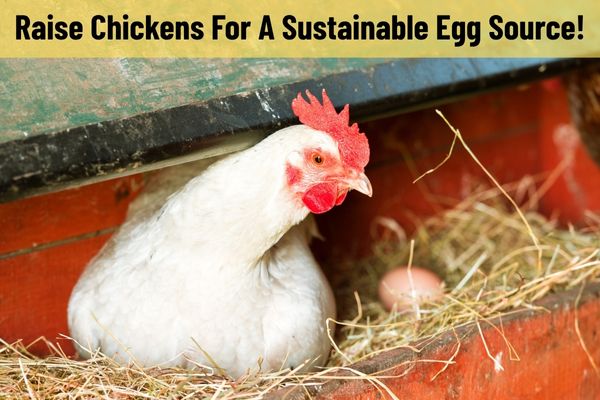Raising Chickens For More Than Just an Egg Supply
With the recent surge in the cost of eggs, many homeowners went from casually thinking about raising chickens to produce eggs into a “must-do” venture.
The price of eggs along with the availability of eggs is a huge concern for anyone that includes eggs as a staple food.
Raising chickens can offer many benefits than just providing a continuous supply of fresh eggs to a prepper’s food supply.
Chickens and Prepping
Let’s get one thing straight. You don’t have to be a farmer to raise chickens. And for the effort you would get much fresher eggs than store-bought.
In addition to eggs, having chicken to eat should the need arise could be an important supplement to your food supply.
Let’s delve into more specifics about why preppers should consider raising chickens.
Chickens Provide a Reliable, Self-Sufficient Food Source
A general rule of prepping is to become as self-sufficient as possible. And what’s more self-sufficient than being able to walk over to your chicken coop to gather eggs.
Eggs are loaded with protein, essential vitamins and nutrients, making them a go-to food. The chickens that you raise could have a better chance to remain healthy than commercially raised chickens. However, raising your own chickens ensures that you’ll yield fresh eggs daily under your careful watch.
And if you’re wondering, the color of eggs are based on the breed of chicken and does not affect taste or nutritional value.
Chickens Provide Pest Control
Have you seen the cost of pest control companies lately? Well, chickens can help with pest control in your yard and garden as they forage for insects. Chickens especially target are mosquitos, ants, horse flies, ticks, slugs, and more.
Chickens “Make” Nutrient-Rich Fertilizer
Chicken manure, also known as chicken “poop” makes an effective fertilizer. That’s because chicken manure is rich in nitrogen, phosphorus, and potassium … all the chemicals that can improve the health of soil.
One note: You need to let the chicken manure age a bit before you can add it to your garden as natural fertilizer.
Chickens Aid Waste Reduction
Preppers know that in a disaster situation, the likelihood of trash pick-up is slim to none. So, you need to do anything you can to reduce waste. Well, chickens like scraps of food from your kitchen as well as weeds and other rubbish from your garden. The same holds true for any uneaten leftovers that you were planning to discard. The less garbage that you place in the trash, the better it is for waste reduction and creating a sustainable home.
Raising Chickens May Be Easier Than You Think
Chickens are considered low maintenance animals. It may take about 30 minutes to feed the chickens, provide fresh water, lead them out of their coop during daylight, and then put them back inside the coop in the evenings. Part of your daily routine will be to collect the eggs.
As for the not so pleasant task of cleaning the chicken coop, the clean-up schedule will depend on the type of litter you use and the number of chickens you have.
Chickens are Cost-Effective
While there is an upfront cost to adding chickens as a food supply, raising chickens could be cost-effective in the long run. In fact, it’s been said that raising chickens costs less money than raising a dog or cat.
Initially, there will certainly be a decent amount of money spent to build or buy an adequate chicken coop and purchase baby chicks or fully grown chickens. Ongoing costs will be associated with buying chicken feed, especially since you’ll want to select organic food varieties to yield the best eggs.
Not only will you reap the benefit of a continuous supply of FREE eggs, but you’ll also be turning your leftover scraps of food into food for the chickens.
Chickens Provide Companionship and a Source of Entertainment
I never considered a chicken to be considered a social animal but apparently, they are. Even further, chickens are looked upon to provide companionship for their owners. The antics of chickens can certainly lighten the mood during a prepper’s bug in.
Selecting From Chicken Breeds
There are multiple chicken breeds that lay eggs. Some breeds can lay more than 200 eggs annually so keep that number in mind when determining how many chickens you’d like to raise. You can base the type of breed and the number of chickens you want to raise to meet your long-term needs.
Egg production varies by breed, age, and health. Popular chicken breeds include:
:: Ameraucana
:: Australorp
:: Bantam Brahma
:: Barred Plymouth Rock
:: Black Stars
:: Buff Orpington
:: Delaware
:: Easter Egger
:: Faverolles
:: ISA Browns
:: ISA Reds
:: New Hampshire Red
:: Olive Egger
:: Rhode Island Red
:: Sussex
:: White Leghorns
:: Whiting True Blue
:: Wyandottes
Each chicken breed has unique characteristics and temperaments and lays different sized eggs and egg colors.
Research First, Plan Second, Set up Chicken Coop Third
As a prepper, you know the importance of research and planning.
Do not rush into buying chickens until you gain knowledge and skills. The first step is to research the local regulations regarding whether chicken rearing is even allowed in your county or local area. Some local governments and homeowner associations (HOA) have specific ordinances including limiting the number of chickens you can keep.
When you’re researching, do your diligence to determine the type of chickens you want to raise on your property. Each chicken breed comes with a unique set of characteristics including the size and color of eggs, as well as the frequency of egg laying.
Before you purchase chickens, you need to set up an adequate chicken coop. Providing a comfortable and safe environment is critical to raising chickens. The coop has to provide shelter from weather conditions, plus there’s the important issue of keeping predators out.
Will You Add Chickens to your Prepper Plan?
Raising chickens can provide many benefits to preppers that go beyond a continuous source of fresh eggs. Chickens provide natural pest control and natural fertilizer for a more productive garden. This sustainable food source may well be worth the initial investment.




